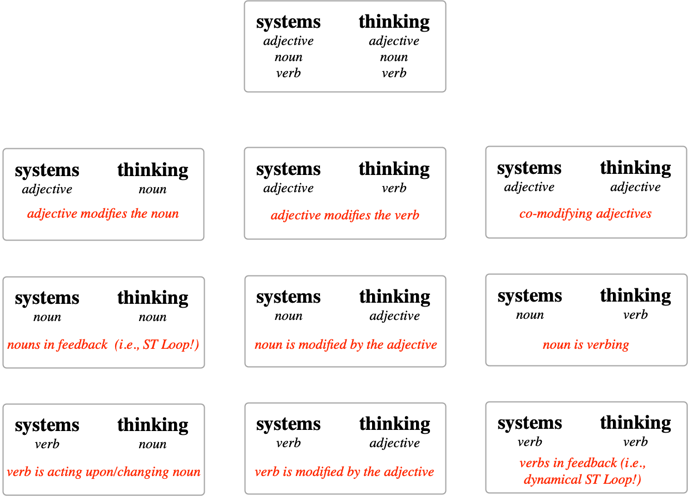Some of the rationale behind our choice of the Spanish translation of Systems Thinking to Pensamiento Sistema
Dr. Castellanos Canales (translator): I have a question—an essential one—about the term systems thinking. I understand that the word "systems" is the adjective of the noun "thinking." The translation to Spanish, however, might be tricky under this logic. What is the difference between systemic thinking (also an adjective modifying a noun) and systems thinking? The exact translation I am currently using for systems thinking is "thinking of systems" (pensamiento de sistemas). That is the most popular translation to Spanish of systems thinking among many authors. We could try to innovate and push pensamiento sistemas (adjectives go after nouns in Spanish), but I must confess it sounds weird
Dr. Derek Cabrera: This is a great question and of essential importance given the name and topic of the book. Not sure I have the answer but perhaps a little discussion could help.
The distinction system vs. systemic is one that lots of folks make a BIG deal out of even in English. I however, do not. I think they are relatively the same with very subtle differences perhaps. With the possible exception that occasionally the term systemic has connotations of "system-wide" and "across a large system" or connotations of a "step-wise analysis." You will likely believe me when I tell you that there are some systems thinking folks who will spend volumes debating these two terms and how dramatically different they are. Again, I do not spend a great deal of time on the issue. For the most part (barring the connotations above), I see them merely as different word forms; the choice of which has more to do with how the language sounds phonetically as it rolls from your tongue than it does a philosophical choice. So, to a large extent everything I say below could be said relatively equally for BOTH terms (systemic and systems).
What I find comforting and elegant about the term "Systems Thinking" (ST) is that it has some double-entendre-like qualities to it which in many ways I think are important to its definition. For example, is ST "a systemic form of thinking" or is it "a form of thinking about systems" or is it "a form of thinking in systems"? My answer: Yes. It is all of those things. I say that, not to be difficult or perplexing, but because the science points us there. To gain the ability for ST, one must understand that there are two major systems at play: (1) the system of thinking and (2) the system one is thinking about. Both of these systems are complex adaptive systems (CASs) and both are part and parcel of systems thinking; because #1 causes us to challenge our biases about #2—thus making ST fundamentally synonymous with metacognition. So, for these reasons, I appreciate the "relative disclarity" that the double-entendre [in English] gives us.
I actually appreciate, for example, that both the terms systems and thinking can all be three parts of speech: verb and noun and adjective. I appreciate this because it belies the simple-complexity of systems thinking and acts not merely as a double-entendre but as a kind of nonuple-entendre (9x entendre):

The "default" definition I use is the adjective modifies the noun (a systems type of thinking) because this communicates clearly that systems thinking is an inherently cognitive science. This might seem obvious to you, but I assure you it was not obvious in the field when I entered it as a young-ish doctoral student. And, this is precisely because of the double-entendre nature that I described above. ST was—until my dissertation—mostly perceived as an approach to the physical sciences (which it is because the systems we are talking about in #2 above are physical in nature (so too is the #1 system but this is an aside wrought with misunderstandings of materialism). Now, many will disagree with me that it wasn't until my doctoral dissertation that systems thinking was specifically called out as a cognitive science. That's perhaps a debate for another day. But I will say this: although cybernetics and many others had called in the importance of second-order effects, it was rare in practice to cite cognitive research, never mind to exercise cognitive studies. Systems thinking mostly stuck to the discussion of physical and socio-technical systems. I agree, of course, that ST is a physical science, but it is also a cognitive science—it is a physico-cognitive science. Because, while it is about systems, it is grammatically [in English] centrally about thinking. Again, this might seem banal and obvious, but it somehow mostly evaded the field for 70+ years.
I must admit that when you said, "We could try to innovate and push pensamiento sistemas..." I got somewhat excited, but that may have more to do with my innovator's spirit than it does with what is the right course of action.
We might save ourselves some trouble by going with "the most popular translation to Spanish of systems thinking among many authors" which is likely to be pensamiento sistemico. But, literally re-translated back to English, I would say it is wrong. Because, pensamiento sistemico or systemic thinking is has connotations of 'across-all' or analytically step-wise thinking. Alternatively, "thinking of systems" (pensamiento de sistemas) only gets at the #2 aspect above and not the critically important #1 aspect. One phrase that is used in English is "Thinking in Systems" (pensamiento en sistemas) which I like more that of/de because it retains its double-entendre nature...Thinking in systems—it could be argued—captures the idea that we must think in systems because the world is comprised of systems (#2) but also that the thinking we do is done in systems [of thinking] because it is fundamentally #1. Perhaps the distinction of en vs de is enough to "innovate and push" the envelope in the Spanish translation? My issue with the inclusion of of/de or in/en makes the terms feel very much one way which takes away the nonuple-entendre of which I am so fond. I like the idea that the space between the words is left as invisible space, much like nature's tendency to hide her secrets in the interstitial spaces and relations in between structures. In that space, is a world of possibility. It is the space where the ST feedback loop resides between reality (systems) and our mental models (thinking).
![March 2021 Blue Belt Systems Trainer Slides [actual slides used] (2)](https://7421276.fs1.hubspotusercontent-na1.net/hub/7421276/hubfs/March%202021%20Blue%20Belt%20Systems%20Trainer%20Slides%20%5Bactual%20slides%20used%5D%20(2).png?width=688&height=387&name=March%202021%20Blue%20Belt%20Systems%20Trainer%20Slides%20%5Bactual%20slides%20used%5D%20(2).png)
Dr. Castellanos Canales (translator): Thank you for the detailed explanation, Derek! Pau and I have been discussing the best alternative to keep the term innovative yet clear in Spanish. Perhaps the best solution—if you agree—is to translate it as pensamiento sistema (both noun and adjective in singular). That term sounds and reads nicely in Spanish! My previous suggestion, pensamiento sistemas, seemed weird because pensamiento is singular and systems is plural.
After a quick search on Google, it appears that nobody is using pensamiento sistema yet. I can totally imagine people in Spanish speaking countries using the term pensamiento sistema. It sounds smart and innovative. Please let me know what you think.
Dr. Derek Cabrera: I love it! Pensamiento Sistema it is!
